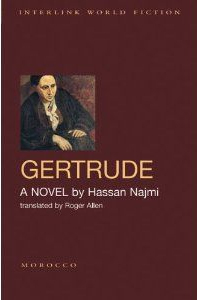By Frances Khirallah Noble
Gertrude
By Hassan Najmi
Interlink Publishing Group, Inc., 2014
The “Gertrude” in the title is Gertrude Stein in her early years in Paris when she establishes her famed salon where some of the most important artists of the era, including Picasso and Hemingway, congregate on Saturday nights. In addition, there is Muhammad, a Bedouin born Moroccan, whom she and Alice Toklas met on a trip to Tangier, where he was their guide and became Gertrude’s lover. Ultimately, Muhammad accepts Gertrude’s invitation to go to Paris and lives in the roof apartment above her house for several years. In Muhammad’s eyes, Gertrude is magnetic and thrilling and her flesh, irresistible. A peripheral participant in her famous salon, he nevertheless meets the illustrious visitors as they congregate and pass through, while his role in the household remains a mystery or source of gossip. One day, Gertrude abruptly and cruelly dismisses Muhammad and he returns to Tangier a broken man, with stories about his life in Paris that no one believes.
The novel begins as Muhammad lies dying and asks a young poet and journalist named Abu Hasan, also a Moroccan, to record his life with Gertrude. As Hasan discovers the truth of Muhammad’s story, he becomes involved with an African American woman diplomat, another strong and compelling woman. She opens doors to the West for him, including an introduction to the Metropolitan Museum in New York to view Picasso’s portrait of Gertrude. This is to be a highpoint in his research, but the elusive portrait is gone when he arrives, having been loaned to a museum in London.
In “Gertrude,” Najmi lyrically intertwines an assortment of loves, jousting between East and West, art and artists, and an imagined view of a softer sweeter Gertrude Stein.
This article appeared in Al Jadid Magazine, Vol. 18, No. 67, 2013-2014.
Copyright © 2014 AL JADID MAGAZINE

